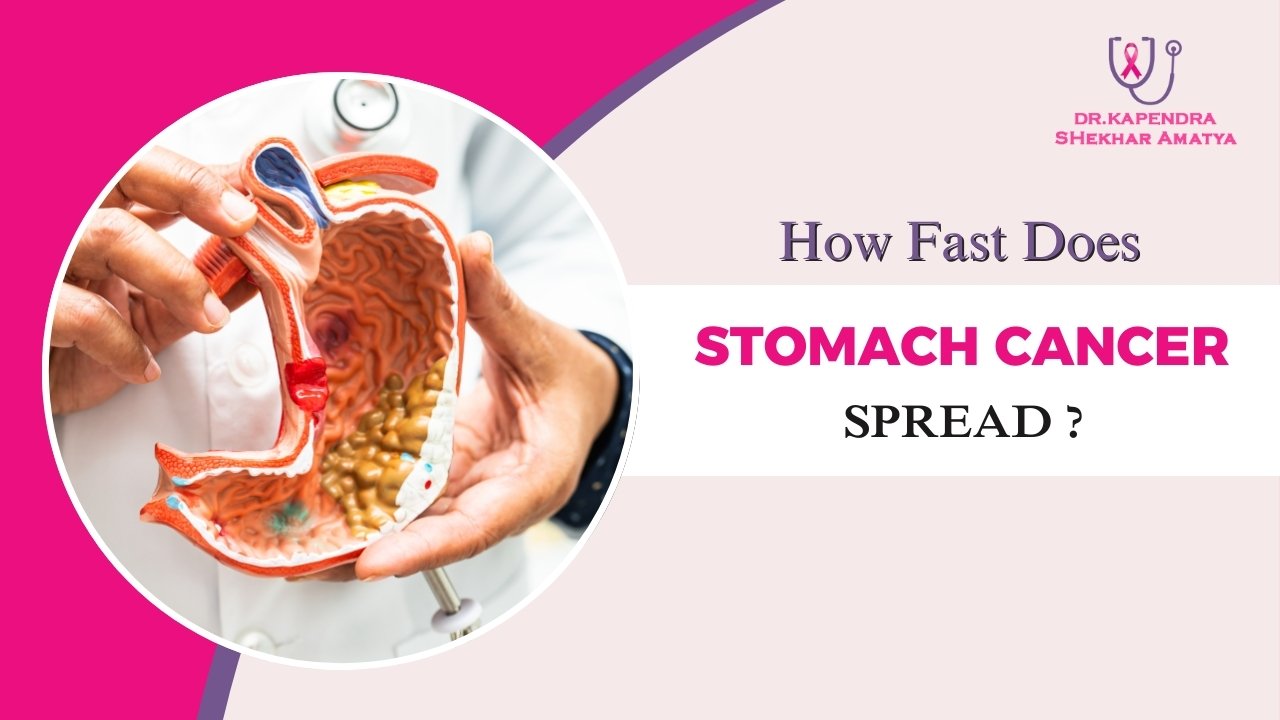Stomach cancer, also known as gastric cancer, is a concerning health issue affecting many. A common question is, “How fast does stomach cancer spread?” Understanding this and recognizing early signs of stomach cancer is essential for anyone at risk. Dr. Kapendra Shekhar Amatya, a leading expert in gastrointestinal oncology, shares insights into the progression, stages, and symptoms of stomach cancer and offers guidance on early detection and timely treatment.
How Fast Does Stomach Cancer Spread?
When diagnosed early, stomach cancer often progresses slowly, limited to the stomach lining. However, untreated cases or late-stage diagnoses may spread faster, affecting nearby tissues and organs. According to Dr. Kapendra Shekhar Amatya, the speed at which stomach cancer spreads depends on several factors, including the cancer’s stage, the person’s overall health, and lifestyle influences.
Knowing how fast stomach cancer spreads can help patients make informed decisions on treatment and lifestyle modifications to reduce the risk of further progression. Early detection and treatment by specialists like Dr. Kapendra Shekhar Amatya can make a critical difference in managing the spread of stomach cancer effectively.
Understanding Stomach Cancer Stages
Stomach cancer progresses through well-defined stages. Each stage represents how much the cancer has grown or spread:
- Stage I: Cancer is limited to the stomach lining, typically with slow growth and fewer symptoms. Treatment at this stage has high success rates if detected early.
- Stage II: Cancer cells may now invade deeper layers of the stomach and even reach nearby lymph nodes. At this stage, the speed of spread is moderate, and more aggressive treatment may be necessary.
- Stage III: Cancer grows beyond the stomach wall, potentially affecting nearby organs. This stage requires comprehensive treatment to prevent further spread.
- Stage IV: In this advanced stage, cancer spreads beyond the stomach to distant organs, such as the liver or lungs. Dr. Kapendra Shekhar Amatya explains that once stomach cancer reaches Stage IV, it can spread rapidly, necessitating advanced treatment options.
Understanding these stomach cancer stages can help patients recognize the urgency of seeking medical intervention and following a treatment plan suited to their specific stage.
Recognizing Early Signs and Stomach Cancer Symptoms
Knowing the early signs of stomach cancer is key to catching it before it spreads further. Common early signs of stomach cancer include:
- Persistent Indigestion: Frequent bloating, heartburn, or gas can be a warning sign.
- Unexplained Weight Loss: Losing weight without changes in diet or activity level is concerning.
- Loss of Appetite: Reduced interest in food, particularly in meat, can indicate a problem.
- Abdominal Pain and Nausea: Regular abdominal discomfort or nausea that doesn’t improve with treatment may signal stomach cancer symptoms.
- Vomiting and Fatigue: In more advanced cases, these symptoms can become severe.
Dr. Kapendra Shekhar Amatya stresses that even subtle signs should prompt a medical evaluation, especially in individuals with a family history of stomach cancer. Early signs of stomach cancer can often be dismissed as common digestive issues, so awareness and timely screening are crucial.
Factors Influencing How Fast Stomach Cancer Spreads
The progression rate of stomach cancer varies depending on factors like:
- Cancer Type and Stage: Different types of stomach cancer may progress at different rates. High-grade cancer cells often spread faster than low-grade ones.
- Overall Health and Age: Younger, healthier individuals may experience slower cancer progression than older adults with other health issues.
- Lifestyle Factors: Lifestyle elements such as diet, smoking, and alcohol consumption can accelerate the progression of stomach cancer.
According to Dr. Kapendra Shekhar Amatya, these factors make regular screenings and lifestyle adjustments essential for high-risk individuals to reduce the likelihood of stomach cancer spreading quickly.
Treatment Options: Slowing the Spread of Stomach Cancer
Dr. Kapendra Shekhar Amatya recommends personalized treatment approaches depending on the stage of the cancer and the patient’s overall health. Key treatment options include:
- Surgery: For early-stage stomach cancer, surgical removal of tumors is often effective in preventing spread.
- Chemotherapy and Radiation: These are used to slow the spread in regional and advanced stages, targeting and shrinking tumors.
- Immunotherapy: For some cases, immunotherapy can support the immune system in fighting cancer cells, slowing progression.
Each treatment is tailored to the patient’s needs, and Dr. Amatya emphasizes that timely treatment can effectively reduce the speed at which stomach cancer spreads.
How Early Detection Can Improve Outcomes
The best way to prevent stomach cancer from spreading rapidly is through early detection. Dr. Kapendra Shekhar Amatya advocates for regular screenings, especially for individuals with a history of stomach cancer in the family. Routine check-ups allow for detection in the initial stages, significantly slowing the progression rate and improving treatment outcomes.
Final Takeaway: Stay Informed and Seek Prompt Medical Advice
For anyone at risk, understanding how fast stomach cancer can spread and recognizing the early signs of stomach cancer is vital. By consulting specialists like Dr. Kapendra Shekhar Amatya, individuals can make proactive decisions that improve treatment effectiveness and reduce the impact of stomach cancer. Early detection, timely intervention, and adopting a healthier lifestyle are the best ways to address this serious health issue and improve long-term outcomes.


